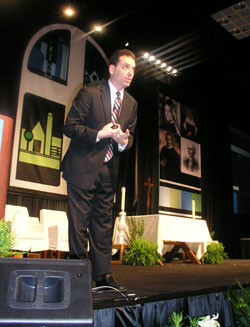NCEA Convention
Author Daniel Pink urges Catholic educators to teach students empathy

Daniel Pink, the author of A Whole New Mind, told educators attending the National Catholic Educational Association on March 27 that empathy is highly desired in the changing economy, a quality he sees at the core of Catholic education. (Photo by John Shaughnessy)
By John Shaughnessy
According to Daniel Pink, Catholic education and a comedian offer insights into two of the qualities that are needed to succeed in a changing economic world.
“Big-picture thinking” is valued, said Pink, who shared this thought from comedian Sid Caesar to make his point: “The guy who invented the wheel, he was an idiot. The guy who invented the other three, he was a genius.”
The comment drew a roar of laughter from the audience, who came to hear Pink speak at the National Catholic Educational Association convention on March 27 in Indianapolis.
Then Pink, the author of A Whole New Mind, had the audience nodding in agreement when he mentioned that empathy is also highly desired in the changing economy, a quality he sees at the core of Catholic education.
“Empathy, the ability to stand in someone’s shoes, to feel with their hearts and see with their eyes,” Pink told the educators from across the country who had come to Indianapolis for the three-day convention.
“Think of how empathy-centered many of your schools are. Think about the Christian-Catholic teaching. Think of the life of Jesus and how it’s really a lesson in empathy. Empathy makes the world a better place.”
During his hour-long presentation at the Indiana Convention Center, Pink mixed humor and factual insights to show how the world economy is changing and how educators will have to prepare students differently to succeed in that world.
According to Pink, the world of work is changing from an age where “logical, linear and spreadsheet-type abilities” were keys to success. While those skills continue to be important, he said, we’re headed to an age where the abilities of “artistry, empathy, inventiveness and big-picture thinking” are becoming more essential.
Jobs in America that once relied on following a certain set of steps to perform are disappearing to countries in Asia where they can be performed more cheaply, he said.
So educators need to increasingly focus on developing those “right brain” skills where a person’s creativity and humanity make a difference.
“We need to prepare kids for their future, not our past,” Pink said.
Pink believes he has seen the future—and education’s importance in leading people there.
It’s a place where some medical students are already getting part of their training in an art museum to help them develop their observational and diagnostic skills so they will become more caring doctors.
It’s a world where two-thirds of the incoming students at a prestigious engineering college have partly been chosen because they play a musical instrument, which reflects their diverse talents and their artistic interests.
Those approaches reflect a “symphony” perspective to education, using “big-picture thinking” to create patterns of meaning and purpose, he said.
Pink also believes we’re at a point in history where people are searching more and more for the meaning and the purpose of their lives even as they experience stunning prosperity compared to previous generations.
“The standard of living in middle class families in America is breathtaking,” Pink said, noting that 69 percent of Americans own homes and 87 percent have mobile phones.
Still, “there’s a gap between rising prosperity and stagnating satisfaction,” he said. “That gap is a big deal. That gap explains why there is a widespread search for meaning, purpose and significance in America today. People have been liberated by prosperity, but not fulfilled by it.”
In that search for fulfillment, Pink advocates that people should pursue a career they love to do. He also recommends that people become involved in an effort where they feel they are part of something larger than themselves.
“Religious education is about connecting with God and a higher purpose,” Pink said during this talk.
In an interview later, Pink also mentioned how helping others improves our own lives.
“The ethic of service is really important,” he said. “One of the ways that people live that level of satisfaction is through service to others.”
Pink’s message struck a chord with teachers.
“I love where he says to keep the creativity in our schools,” said Shelley Sargent, the art teacher at St. Rose of Lima School in Franklin.
Gloria Adams was also thrilled by Pink’s presentation.
“A lot of the facts and statistics he gave us, he’s showing us that we need to use the right side of our brains more,” said Adams, a first-grade teacher at St. Rose of Lima School. “As a Catholic school, we have a lot of ways we can do that—through the liturgy, the way we reach out to the community, the way that Christ lived and the way we try to teach our kids about the way Christ lived.” †
